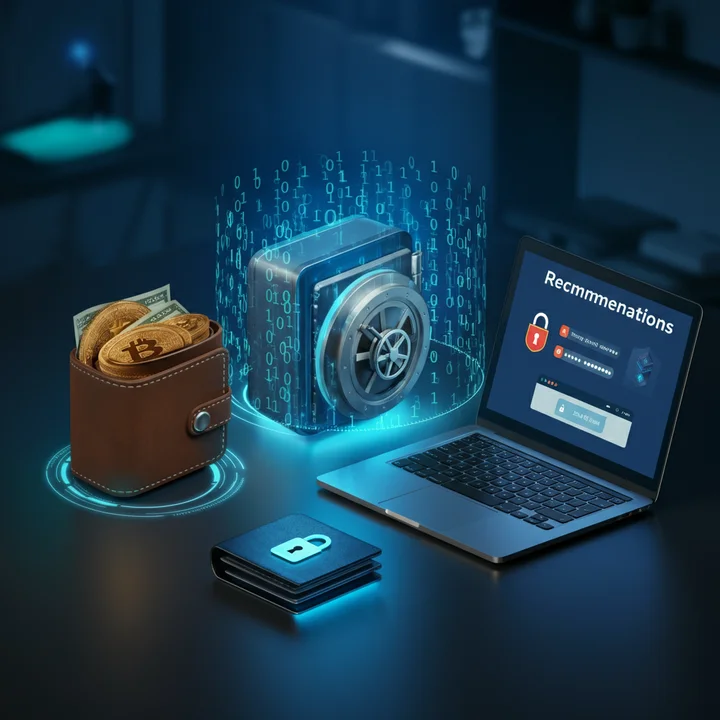Cryptocurrency is transforming finance, allowing people to trade and invest in a decentralized, digital-first world. However, as the market surges, so too does the risk of falling victim to cryptocurrency scams.
Every day, new fraudsters try to exploit the lack of regulation, anonymity, and the rapid pace of crypto adoption. Whether you're new to cryptocurrency or a seasoned trader, it’s crucial to understand the common scams, how to spot warning signs, and the steps to protect your digital wealth.
This blog will guide you through the most prevalent cryptocurrency scams, real-life examples, how to identify red flags, and actionable tips to secure your digital assets.
Common Types of Cryptocurrency Scams
1. Phishing Attacks
Phishing scams have long been a favorite of cybercriminals, and cryptocurrency is now their latest target. These scams often involve fake emails, messages, or websites designed to trick you into sharing sensitive information like private keys or wallet credentials.
For example, a phishing website may mimic the URL and design of a popular exchange like Binance, Coinbase, or MetaMask. Once you log in, scammers steal your information and drain your funds.
How to Avoid Phishing Scams:
Never click on links from unsolicited emails, direct messages, or chats.
Verify URLs carefully. Scammers often use subtle variations like "Binannce" instead of "Binance."
Use hardware wallets and only download wallet apps from official sources.
2. Fake Giveaways
You’ve likely seen social media posts from seemingly reputable accounts promising to multiply your cryptocurrency if you send them some first. These fake giveaways, often impersonating celebrities or companies, lure victims with "too-good-to-be-true" offers.
How to Spot Fake Giveaways:
Genuine giveaways don’t ask for an upfront “investment.”
Look for typos, copy-pasted comments, or accounts with minimal engagement.
Confirm directly from official brand or influencer channels before buying in.
3. Rug Pulls
Rug pulls are a type of scam where project developers build hype around a new cryptocurrency, token, or decentralized finance (DeFi) platform, only to abandon the project once enough funds are extracted. This leaves unsuspecting investors with worthless tokens.
Well-Known Example:
The infamous “Squid Game” token gained traction due to the popularity of the Netflix series. After skyrocketing to $2,860 per token, the developers vanished, and the token's value dropped to near zero overnight.
How to Avoid Rug Pulls:
Carefully vet projects; look for transparent teams with verifiable LinkedIn profiles or prior reputation in the space.
Review the project's whitepaper and long-term roadmap.
Be skeptical of projects with no lock-up period for team funds or anonymous developers.
4. Pump-and-Dump Schemes
Pump-and-dump schemes involve artificially inflating the price of a cryptocurrency by spreading hype or false information, only for the fraudsters to sell their holdings at a profit after luring in investors. Once the "pump" is over, prices crash, leaving investors empty-handed.
How to Spot a Pump-and-Dump Scheme:
Sudden, suspicious price hikes in lesser-known tokens.
Dubious “insider tips” or influencers promoting the coin aggressively.
Low-trading-volume coins that suddenly trend.
5. Fake Exchanges and Wallets
Some scammers set up fake crypto exchanges or wallet services that look highly professional. These platforms often charge exorbitant fees or simply disappear with users’ assets.
Warning Signs of Fake Platforms:
Unverified reviews or a lack of industry recognition.
No two-factor authentication (2FA) feature offered.
Unrealistic promotional offers like “free Bitcoins upon registration.”
Always verify a platform’s legitimacy by researching it on forums like Reddit, BitcoinTalk, and trusted review sites.
Real-Life Scam Examples
Here are some noteworthy examples of crypto scams that highlight the risks involved in this space:
Bitconnect (2016-2018): Bitconnect falsely promised high returns through lending programs. Investors lost close to $4 billion when the scheme unraveled, demonstrating the dangers of Ponzi schemes in crypto.
Twitter Bitcoin Giveaway Hack (2020): Hackers took control of prominent Twitter accounts, including those of Elon Musk and Barack Obama, to promote fake Bitcoin giveaways. Victims lost over $120,000.
Each of these cases reinforces why vigilance in the cryptocurrency world is crucial.
Warning Signs to Look For
To protect yourself from falling victim, watch out for these red flags in any crypto-related opportunity:
Overpromising returns (e.g., "Get 100% ROI every day!")
Lack of transparency about teams, whitepapers, or technology.
High-pressure tactics like limited-time offers.
Unsolicited messages or DMs asking for sensitive information.
Projects with vague goals or plagiarized websites and whitepapers.
Trust your gut. If it feels shady or too good to be true, it probably is.
How to Report and Recover From a Scam
If you’ve fallen victim to a cryptocurrency scam, here are steps you can take to report the crime and attempt recovery:
Act Quickly: Contact the exchange or wallet provider immediately. They may be able to freeze funds or assist in recovery.
Track Transactions: Use blockchain explorers like Etherscan or Bitcoin Block Explorer to trace where your funds were sent.
File a Complaint: Report scams to regulatory bodies or consumer protection agencies like the Federal Trade Commission (FTC) and IC3 (Internet Crime Complaint Center).
Raise Awareness: Inform the crypto community by sharing your experience on forums or review websites to help others avoid similar fraud.
While recovery rates for crypto scams are low, reporting fraud is essential to track illicit actors.
Final Tips to Protect Your Crypto Investments
Security Best Practices:
Use Cold Wallets: Hardware wallets (e.g., Ledger Nano X or Trezor) add an extra layer of security, keeping your funds offline.
Enable Two-Factor Authentication (2FA): Always use 2FA for all exchanges and wallets.
Install Antivirus Protection: Protect your devices against phishing links and malware.
Research Before Investing: Always perform due diligence before investing in new coins, ICOs, or DeFi platforms.
Avoid Sharing Private Keys: No legitimate service will ask for your private keys, seed phrases, or passwords. Keep them secure.
Lastly, educate yourself continually. Crypto scams are always evolving, so staying informed is your best defense.
Don’t Become a Statistic: Stay Secure in Crypto!
Whether you're a casual user or a seasoned trader, protecting your investments from cryptocurrency scams is crucial. By being aware of these common fraud schemes, understanding what to watch for, and following proven security measures, you can enjoy the benefits of cryptocurrency while reducing risks.
Stay skeptical, stay informed, and always double-check before you invest or share sensitive information.
Looking to maximize your security? Start using a trusted security tool or wallet provider to add another layer of protection to your crypto portfolio.



